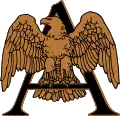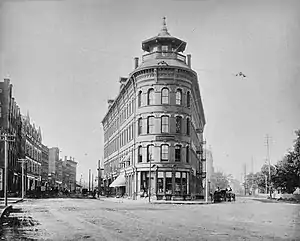American Writing Paper Company
The American Writing Paper Company was an American pulp and paper producing company trust, primarily manufacturing printing and writing paper. Incorporated in New Jersey in 1899 and representing the merging of 23 rag paper mills, the company held its general offices in Holyoke, Massachusetts which was also the location of 13 of these mills.[5][6] At its peak output American Writing Paper produced 75% of all fine papers in the United States; contemporary accounts describe it as the largest producer of fine papers in the world.[7][8]
 | |
 The "Flatiron Building"; originally offices for Parsons Paper Company, it was the AWPC's headquarters from 1899-1952, when it was razed[1] | |
| Industry | Pulp and paper |
|---|---|
| Founded | 1899 |
| Fate |
|
| Successors | Holyoke Shares, Inc. (1962-1970) |
| Headquarters | Holyoke, Massachusetts, United States |
Area served | Worldwide |
The company's failings have been described by historical scholars, including Constance McLaughlin Green, as a matter of a lack of technical expertise in management.[9] Rather than forming from within the paper industry, “both the original promoters [of the trust] and the final agents were brokers and not paper manufacturers. The result was that these men were primarily interested in marketing the stocks and bonds, and not one was concerned with the manufacture of paper.”[10] Initially the company board sought papermaker and former congressman William Whiting II to serve as its chief executive. Whiting would decline their offer, and indeed the company was unable to absorb his own namesake company, which would become the largest independent manufacturer of writing paper in the United States contemporarily with the trust.[7]
The American Writing Paper Company would endure multiple labor strikes and two bankruptcies before being entirely liquidated under the name "Holyoke Shares", beginning with reorganization as an investment company under that name in 1963, dissolving by the end of 1970.[11][12] Today it is best known for its "Eagle A" brand which has since been sold to multiple successors,[2] until it was discontinued in 2007 by the Neenah Paper Company.[3][4]
Merged properties
The mills and properties which the company assumed included but were not limited to-[5][13]
- Agawam Paper Company
- Albion Paper Company
- Beebe & Holbrook Paper Company
- Crocker-McElwain
- George R. Dickinson Paper Company
- G. K. Baird Paper Company
- Holyoke Paper Company
- Linden Paper Company
- Mount Tom Paper Company
- Nonotuck Paper Company
- Norman Paper Company
- Oakland Mill, Butler and Hudson
- Parsons Paper (No. 1)
- Platner and Porter Manufacturing Company
- Riverside Paper Company
- Wauregan Paper Company
._-_NARA_-_518334.jpg.webp)
See also
- American Pad and Paper Company
- International Paper, competitor, and present largest producer of paper and pulp in the world; whose founding chief engineer was an apprentice of D. H. & A. B. Tower, the architectural firm of the majority of American Writing Paper's mills
References
- "Coletti Firm Gets Race St. Widening Job". Springfield Union. Springfield, Mass. September 16, 1952. p. 23.
The board gave a permit to the Springfield Wrecking Co. for the razing of the flatiron building, the former general office of the American Writing Paper Corp. The site will be used for the building of the new branch bank of the Hadley Falls Trust Co.
- "Massachusetts". The Berkshire Eagle. Pittsfield, Mass. September 14, 1976. p. 7.
HOLYOKE - The Brown Company's Eagle A-Linweave Division will terminate the jobs of up to 150 papermakers at the end of September because one of two lines of paper the company makes here has been sold. The parent firm, based in Pasadena, Calif., sold the Eagle A, cotton-content line and related papers to the Fox River Paper Co in Appleton, Wis. The sale means a production capacity decline of about 50 per cent in the Holyoke factory which employs about 390 persons, a spokesman said Another company spokesman said Brown will soon introduce a new paper line called the 'First Edition,' signaling the Brown Company's intention to strengthen their remaining business at the Holyoke location.
- "Neenah Paper Completes Purchase of Fox River Paper". Neenah Paper, Inc. March 1, 2007. Archived from the original on June 27, 2015.
- "Eagle-A Trojan Bond Radiant White 24# 8.5"x11" Light Cockle 25% Cotton". Limited Papers. Archived from the original on June 23, 2018.
- Valente, A. J. (2010). Rag Paper Manufacture in the United States. Jefferson, NC: McFarland & Company. p. 179. ISBN 9780786459971. OCLC 681620170.
- "NEW COMPANIES IN NEW JERSEY.; American Writing Paper and American Isthmus Ship Canal Companies". The New York Times. July 1, 1899. p. 11.
- Root, Joshua L. (Fall 2009). "Something Will Drop: Socialists, Unions and Trusts in Nineteenth-Century Holyoke" (PDF). Historic Journal of Massachusetts. 37 (2): 38. Archived from the original (PDF) on 2017-12-24.
- "Stabilizing the Paper Industry, A Lesson for Those Who Will Learn". Pulp and Paper Magazine of Canada. Vol. XIX. June 16, 1921. p. 635.
- Green, Constance McLaughlin (1939). Holyoke, Massachusetts; a case history of the industrial revolution in America. Yale Historical Publications. New Haven: Yale University Press. pp. 188–194.
- Hickey, John P. (1953). The Holyoke Area Paper Industry, 1899-1951 (Master of Arts). Amherst, Mass.: University of Massachusetts. p. 5.
- Hubbard, Charles L.; Hawkins, Clark A. (1969). Theory of valuation. Scranton: International Textbook Co. p. 241.
- [Query- "Holyoke Shares, Inc."], Massachusetts Corp. Card Search, Corporation Cards of the Commonwealth of Massachusetts, Secretary of the Commonwealth
- Annual Report of the Holyoke Board of Water Commissioners. 1912. pp. 115–117.
External links
| External video | |
|---|---|
- American Writing Paper Company Collection, Special Collections and University Archives, University of Massachusetts Amherst
- Discovering New Facts About Paper, promotional literature by the American Writing Paper Company